To Create an Alternative Economy
A consumer who produces
The Seikatsu Club movement, “a consumer who produces”, promotes the following objectives in co-operation with consumers and producers who act as equal partners through collective purchase movement and business:
- To reveal absurdity and mechanisms of society from the viewpoint of ordinary citizens
- To share with producers the risk of time, space, and cost of improving agricultural methods and production process necessary for production
- To not deprive others of food (including overseas)
- To realize a truly necessary “alternative production-distribution-consumption-disposal” social system.
Partnership with producers
Producer cost guarantee system
The prices of main consumer goods are determined only after disclosure of all information about quality of products, production methods, packaging materials, storage and distribution, delivery cost, etc., thorough discussion, and mutual approval.
Consumer materials development
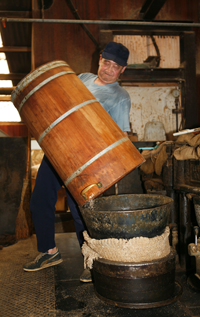
Seikatsu Club have adopted the term “consumer materials” whereby members employ their collective power of purchase since items are not “commercial goods” for sale, but are for use-value. The items to be developed are determined in a monthly Union’s Consumption Committee based upon the members’ demands and views.
New consumer materials are developed with mass participation of members. Recruited members complete a questionnaire for taste, packaging, price etc., together with market research, to decide the specifications. They then discuss with producers the area of production and the production process, experiment over packaging materials and content volumes, and decide the price.
Seikatsu Club has about 1,600 regular items annually, compared with the over 9,000 items of other co-ops. We demonstrate an alternative life and society, being against mass production, mass consumption, and mass disposal, and by developing consumer materials highly necessary for life, and trying to solve problems of health, environment and safety, as well as members purchasing goods. Also, as members themselves participate in development, it becomes possible to guarantee quality control and safety over materials and the production process and to disclose the information about consumer materials.
Independent Control and Auditing System
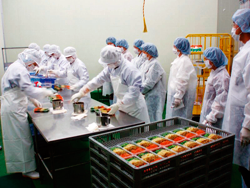
In our Independent Control and Auditing System, based upon the Seikatsu Club principles of safety, health and the environment, members of the Independent Control Committee, consisting of both members and producers, form sub-committees for agriculture, fishery, livestock raising, processed foods, daily commodities, packaging materials, etc. and set independent standards. The producers are supposed to disclose information as to whether their products meet the Committee’s production standards. “Mass independent control” gives the committee members an opportunity to actually check whether independent standards are truly realized through study session and on-spot inspection. This is a unique auditing system and only Seikatsu Club can achieve such a high level of information disclosure. About 500 independent audits by about 4,000 members were conducted up to 2006. Once a producer achieves the independent standards objectives, a higher level of standards is set.
Get to know the production site and participate in production
Planned labour participation
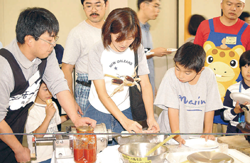
Seikatsu Club members started a planned participation of planting and harvesting tomatoes for processing use in 1995. A stable production of tomatoes for juice use has been secured through consumers’ continuous participation. Such production is rare in Japan because of aging producers and hard labour during hot summers.
Exchange of personnel and information between consumers and producers
The Seikatsu Club members and producers visit each other in order to exchange views directly and the information of consumer materials how to cook even among the members. They also study the national agricultural policies and the issue of genetically modified food and discuss how to tackle them.
Three Seikatsu Club-owned milk factories
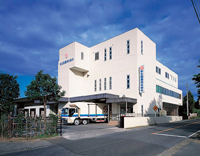
Seikatsu Club jointly invested in and founded its own milk factoriesthe first and still the only consumers’ milk co-operatives in Japan. The milk factories are also a symbol of our attitude towards living with producers as well as of the movement to raise self-sufficiency. The consumers and 100 milk producers with 5,000 cows co-operate to produce milk in urban neighbourhoods. They disclose information from the rearing environment through to production operation, and secure a higher level of raw milk, based upon our strict standards in order to change from an ultra-high-temperature sterilized milk, dominant in the Japanese market, to a pasteurized milk.
Development and maintenance of domestic species
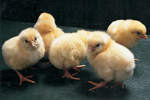
We do not only oppose genetic modification, but also make an effort to develop and maintain species fit for the Japanese climate, such as domestic species of chicken (for meat and eggs), pigs, Japanese-origin cows, cows for both milk and meat, and rape flowers for stable oil production.
Model for foods self-sufficiency and community
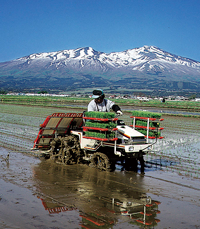
Feed rice Project
Japan’s general food self-sufficiency ratio is 39%, and an even lower 27% in the case of grain (including animal feed) self-sufficiency. This is the lowest of the developed countries. Over 74% of farmers are over 60 years old and 400,000 ha out of 4.6 million ha of farmland in Japan are idle. If feed rice is grown on this idle farmland to reduce the importation of feed for chickens and pigs, the self-sufficiency ratio is calculated to rise by over 5%. We started a Feed rice Project in co-operation with Yuza-machi (Yamagata Pref.), J.A. Shonai Midori (a contract producer of rice), Hirata Bokujo (a contract producer of pork), and Yamagata
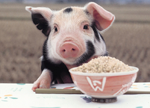 University to test this assumption. In 2011, 1,608 ha were planted with feed rice and we successfully persuaded the national government to subsidize the project. Thus the solidarity of consumers and producers are influencing national agricultural policies.
University to test this assumption. In 2011, 1,608 ha were planted with feed rice and we successfully persuaded the national government to subsidize the project. Thus the solidarity of consumers and producers are influencing national agricultural policies.

生活クラブをはじめませんか?
42万人が選ぶ安心食材の宅配生協です
ウェブ加入限定 無料プレゼント






